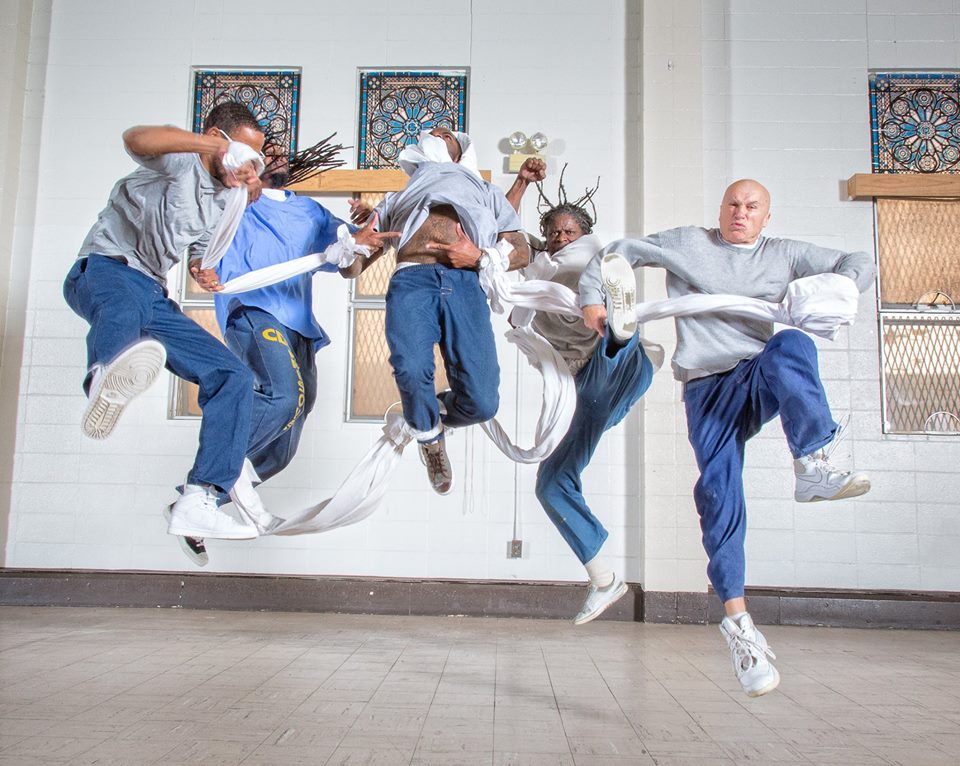About the Residency
Boundaries Between Bodies brings artists Reggie Daniels and Amie Dowling to facilitate workshops and present projects that are striving to begin a collective process of political struggle where inside and outside artists are working side by side for a transformation that addresses the legacies of racism, segregation, disenfranchisement, and mass incarceration. They will visit the Elm Street Think Tank at the Franklin County Jail and various classes at Hampshire College and Amherst College. They will also share their work at two public events:
Boundaries Between Bodies: Public Presentation & Film Screening
Friday, February 23rd at 4pm
Franklin Patterson Hall – East Lecture Hall, Hampshire College
Community Engaged Performance & Activism Workshop
Saturday, February 24th from 3:00-5:00pm
School for Contemporary Dance and Thought, Northampton, MA
This workshop is designed for people who are curious about community-engaged performance practices and how those practices can address critical systemic issues facing our communities. For over a decade, facilitators Reggie Daniels and Amie Dowling have collaborated on performance and film projects focusing on the eradication of mass incarceration.
The workshop will consider questions such as: What can artists offer to combat today’s climate of injustice? How does deficit thinking shape projects, and what can be done about it? How can performance projects build beneficial community relationships?
Register for the workshop here. The workshop is free for 5 college students. Wear clothing you can move in, bring a notebook and something to write with!
The statistics are well known…Today in the United states there are 2.2 million people who are currently incarcerated. 6.2 million on parole and probations, 64 million people who have criminal records affecting their ability to find housing, receive food stamps, get jobs and vote.
We know that mass incarceration is not just about individual acts of criminality or individual responsibility. Rather, it confirms that the United States’ punishment system is a much larger problem, at the root of which is institutional and racial inequity.
The imprisoned body is one of the primary sites of carceral control, an elaborate choreography of containment and segregation. Behind prison walls, regimented rituals of eating, cleaning, labor and leisure curtail individual freedom of movement in the service of “orderly” systems, notating where and how one moves through space and time, shaping relations between objects, spaces, bodies.
Then how do incarcerated artists create work? How do inside and outside artists, working in an inhumane system, develop a creative process that supports humanity? How do outside artists use their platform to develop work inside facilities that critiques mass imprisonment and its conditions of emergence? How can the subversive role as artists ask more radical questions about the uses of locking people away in the first place? How does transmission occur when stage and audience are separated by a system of mass incarceration that disappears certain bodies?
Reggie Daniels, a core member of the artistic team of the dance/theater films Separate Sentence and Well Contested Sites, and co-author/choreographer and performer of ManAlive; from the edge of incarceration to the flight of imagination. He completed his master’s degree in May 2014 at the University of San Francisco in the School of Management and is currently a doctoral candidate in the Organization and Leadership Program in School of Education at USF. His research focuses on, in-custody violence prevention program efficacy and culturally responsive pedagogy.
Amie Dowling creates dance and theater for the stage, for film and in community settings. For the past 16 years, her work has considered the politics and representation of mass incarceration. Well Contested Sites, a collaboration with Bay Area artists, some of who were previously incarcerated, won the International Screendance film prize. The next film, Separate Sentence, looks at the intersection of gentrification and the generational impact of incarceration, and is currently being screened and has received best film awards nationally and internationally. Amie is an artist in residence in the San Francisco Jails and San Quentin Prison, where she is a member of the Artistic Ensemble. She is an Associate Professor in the Performing Arts Department at the University of San Francisco.
This residency is organized by Ethics & the Common Good and the Art Gallery at Hampshire College in collaboration with Hampshire College Dance Program, Hampshire College Theater Program, UMass History Department, Amherst College Theater and Dance Department, and the Five Colleges.


